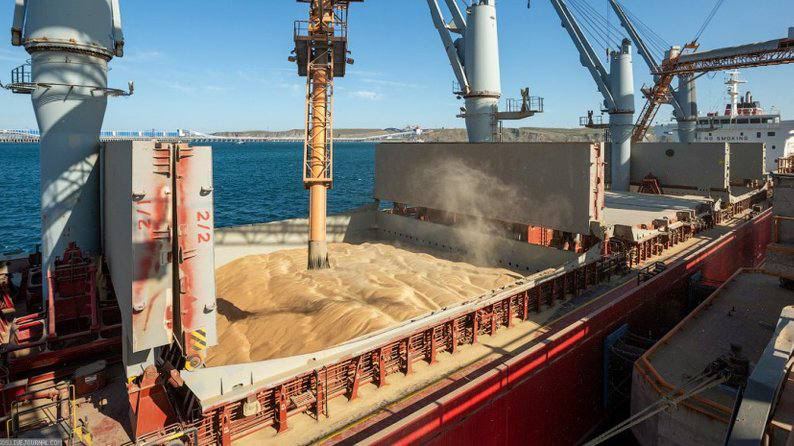A joint investigation by Skhemy (a project of Radio Svoboda), the Belarusian Investigative Center, and the publication Verstka, based on leaked documents from the occupied part of Kherson Oblast, reveals that Kremlin-appointed governor of the occupied part of Kherson Vladimir Saldo, and a specially created local commission approved Russian companies to export Ukrainian agricultural products abroad with zero or reduced export duty rates.
According to the report, the journalists obtained the data trove from KibOrg, a collective of Ukrainian hackers. The investigators corroborated the grain exports by utilizing data from the Import Genius global import/export database and information obtained from a leak from the Russian customs service.
During 2023, under the quota system established by the Russian authorities, the report states that a number of Russian exporters exported at least 34,000 tonnes of grain worth €6.2 million ($6,7 mn) from Kherson Oblast.
The grain from Kherson was exported to Azerbaijan, Türkiye, Syria, and Iran, while peas from the occupied Crimea were sent to Spain.
The investigation notes that the Russian company Sim-Trans Group exported wheat to Azerbaijan after obtaining permission to export 2,200 tonnes of wheat and meslin from the oblast under the quota system.
Another Russian company, TD Fregat, received a quota to export 3,000 tonnes of corn, ending in Syria.
The company OOO Pallada was approved to export 11,000 tonnes of barley under the quotas, which was shipped to the Iranian port of Bandar Imam Khomeini. The investigation states that the carrier was the vessel Mikhail Nenashev, which had already been mentioned in a previous Skhemy report on the illegal export of grain.
The firm Agro-Fregat, previously mentioned in media reports as a participant in the scheme of illegally exporting grain from occupied territories, exported wheat and meslin to Türkiye. In September 2023, the same company sent 4,500 tonnes of peas to Spain, 2,600 tonnes of which were loaded in the occupied Sevastopol.
None of the companies responded to inquiries before the investigation was published.
Skhemy also reported that three months after the announcement of the annexation of four Ukrainian oblasts, on 30 December 2022, the Russian government issued Decree No. 2535, which established quotas (limits) on the export of agricultural products from the occupied territories with customs "discounts," while also establishing a mechanism for exporting these products.
According to the report, "In line with the decree, Russian companies wishing to export products like wheat, barley, corn, or sunflower meal at zero or reduced export duty rates and sell them to third countries must apply to the 'head of the region' according to the rules established by him. In the case of the occupied Kherson Oblast, a special commission was created to allocate quotas. It reviews applications and votes, and the head of the occupation administration, Vladimir Saldo, signs the decision."
The article notes that in June 2022, the Office of the Prosecutor General of Ukraine announced the initiation of an investigation into the illegal export of grain from the territories of Zaporizhzhia and Kherson Oblasts. At that time, Skhemy established the routes taken by trucks from the southern occupied oblasts to ports in Crimea, where the grain was loaded onto vessels.
Read also:
- Russian overnight attack injures two women in Nikopol, causes fire at enterprise in Kyiv Oblast
- ISW: Putin’s slip reveals Russian casualties, force generation challenge
- Ukraine charges Russian general with ordering Kakhovka dam blast

